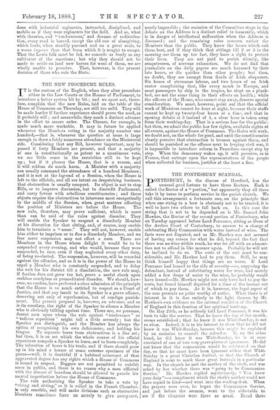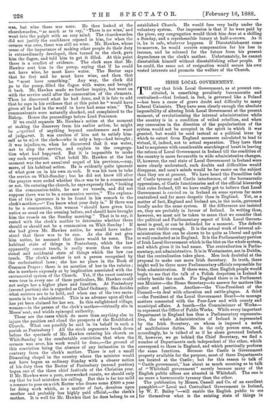THE PONTESBURY SCANDAL.
PONTESBURY, in the diocese of Hereford, has the unusual good fortune to have three Rectors. Each is called the Rector of a " portion," but apparently they all three take it by turns to perform service in the parish church. We call this arrangement a fortunate one, on the principle that when one string to a bow is obviously not to be trusted, it is well to have two others to fall back on. In this case the string that is not to be depended on is Mr. Samuel John Hawkes, the Rector of the second portion of Pontesbury, who on Tuesday appeared before Lord Penzance, sitting as Dean of the Arches Court of Canterbury, to answer to a charge of celebrating Holy Communion with water instead of wine. The facts were not disputed, and as Mr. Hawkes was not accused of having any reason for what he did, beyond the fact that there was no wine within reach, he was let off with an admoni- tion not to offend in like manner again. Probably he will not be inclined to do so. The costs of the suit must be con- siderable, and Mr. Hawkes had to pay them. Still, he may think himself happy that things are no worse. If Lord Penzance had leaned to the side of severity—as, supposing the defendant, instead of substituting water for wine, had merely added a few drops of water to the wine, ho probably would have leaned—Mr. Hawkes might not only have had to pay the costs, but found himself deprived for a time of the income out of which to pay them. As it is, however, the legal aspect of the case presents no point worthy of notice. What there is of interest in it is due entirely to the light thrown by Mr. Hawkes's own evidence on the internal condition of the Church of England in this fraction of her spiritual territory. On May 29th, as he artlessly told Lord Penzance, it was his turn to take the service. That he knew the day of the month, seems established ; that he knew it was Whit-Sunday, is not so clear. Indeed, it is to his interest to show that he did not know it was Whit-Sunday, because this might be explained by an omission to consult the calendar. If, on the other hand, he did know it was Whit-Sunday, he is at once convicted of one of two very grave pieces of ignorance. He did not know that the communion would be celebrated on that day, so that he must have been ignorant either that Whit- Sunday is a great Christian festival, or that the Church of England is wont to mark these great festivals in a particular way. In the church he met the mother of the clerk, and was asked by her whether there was " going to be Communion Service." Mr. Hawkes replied mysteriously, " You know your duty "—a compliment which the clerk's mother could not have repaid in kind—and went into the reading-desk. When the prayers were over, he began the Communion Service, and just before the sermon, went to the side-table to see if the elements were there as usual, Bread there was, but wine there was none. He then looked at the churchwarden, " as much as to say," There is no wine,' and went into the pulpit with an easy mind. The churchwarden did not justify the confidence reposed in him, for when the -sermon was over, there was still no wine. Mr. Hawkes, whose sense of the importance of making other people do their duty is extraordinarily developed, then turned to the clerk, gave him the flagon, and told him to get it filled. At this point there is a conflict of evidence. The clerk says that Mr.
Hawkes sent him to the pump, saying that if he could not have wine, he must have water. The Rector says that he first said he must have wine, and then that he " must have something." Any way, the clerk did go to the pump, filled the flagon with water, and brought it back. Mr. Hawkes made no further inquiry, but went on with the service until after the consecration of the elements. Then he discovered what he had done, and it is fair to add that he says in his evidence that at this point he " would have given all he had in the world to have had some wine." The communicants were naturally shocked, and complained to the Bishop. Hence the proceedings before Lord Penzance. If we could separate Mr. Hawkes's action at the moment of making the discovery from his earlier action, he might be zOquitted of anything beyond carelessness and want of judgtent. It was careless of him not to satisfy him- self as to wint the clerk—who is only a boy—had brought ; it was injudicitirs, when he discovered that it was water, .not to stop the service, and explain to the congrega- Con what had happPned. But it is impossible to make any such separation. What befell Mr. Hawkes at the last moment was the not unnatural sequel of his previous,—nay, more, of his habitual action. He is evidently quite ignorant of what goes on in his own ch'irch. It was his turn to take the service on Whit-Sunday ; but he did not know till after the prayers were ended whether there was to be a communion or not. On entering the church, he says expressly that, " looking at the communion-table, he saw no vessels, and did not suppose there was to be a communion service." The explana- tion of this ignorance is to be found in his remark to the clerk's mother,—" You know what your duty is." If there was to be a communion, this woman " should have given him notice as usual on the evening before, and should have brought him the vessels on the Sunday morning." That is to say, it rested with the clerk's mother to determine whether there should or should not be a communion on Whit- Sunday ! If she had given Mr. Hawkes notice, he would have under- stood that there was to be one. As she did not give him notice, he assumed that there would be none. The habitual state of things in Pontesbury, which the law apparently cannot touch, is really worse than the occa- sional and accidental state of things which the law can touch. The clerk's mother is not a person recognised by the ecclesiastical laws ; she has no place in the Book of Common Prayer ; there is no mention of her in the rubrics ; she is nowhere expressly or by implication associated with the sacramental system of the Church. Yet, if the exact contrary were true in every one of these particulars, Mr. Hawkes could not assign her a higher place and function. At Pontesbury .(second portion) she is regarded as Chief Ordinary. She decides -what services are to be held, and when one of the two sacra- ments is to be administered. This is an advance upon all that has yet been claimed for her sex. In this enlightened village, woman—in the person of the clerk's mother—virtually sits in Moses' seat, and wields episcopal authority. These are the cases which do more than anything else to injure the position and cloud the prospects of the Established Church. What can possibly be said in its behalf in such a parish as Pontesbury ? All the stock arguments break down before the spectacle of Mr. Hawkes entering his church on 'Whit-Sunday in the comfortable conviction that when the sermon was over, his work would be done,—the ground of this conviction being the absence of any intimation to the contrary from the clerk's mother. There is not a small Dissenting chapel in the country where the minister would not have begun an ordinary Sunday with a clearer notion of his duty than the Rector of Pontesbury (second portion) began one of the three chief festivals of the Christian year. If Mr. Hawkes were a poor, overworked curate, we should only say that he had mistaken his calling. But this is far too mild a censure to pass on a rich Rector who draws some £800 a year for doing work which, as a matter of fact, devolves upon another and probably less highly paid official,—the clerk's mother. It is well for Mr. Hawkes that he does belong to an established Church. He would fare very badly under the voluntary system. Our impression is that if he were paid by the piece, any congregation would think him dear at a shilling a Sunday, and a reprehensible luxury at half-a-crown. As it is, he is safe, whatever happens. If Disestablishment came to-morrow, he would receive compensation for his loss in income, and be released for the future from his present dependence on the clerk's mother. Unfortunately, he cannot disestablish himself without disestablishing other people. If he could, the same act of resignation would secure his own vested interests and promote the welfare of the Church.



































 Previous page
Previous page